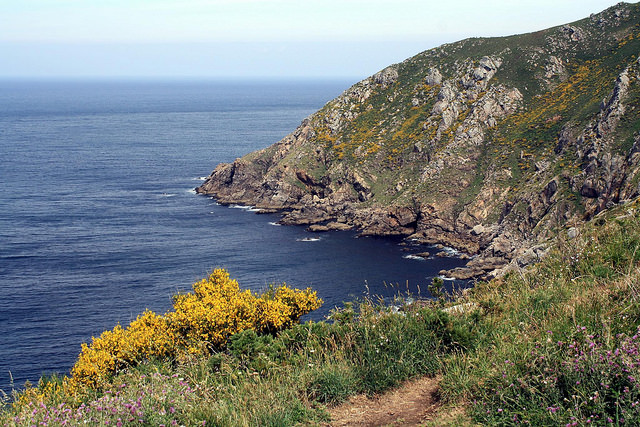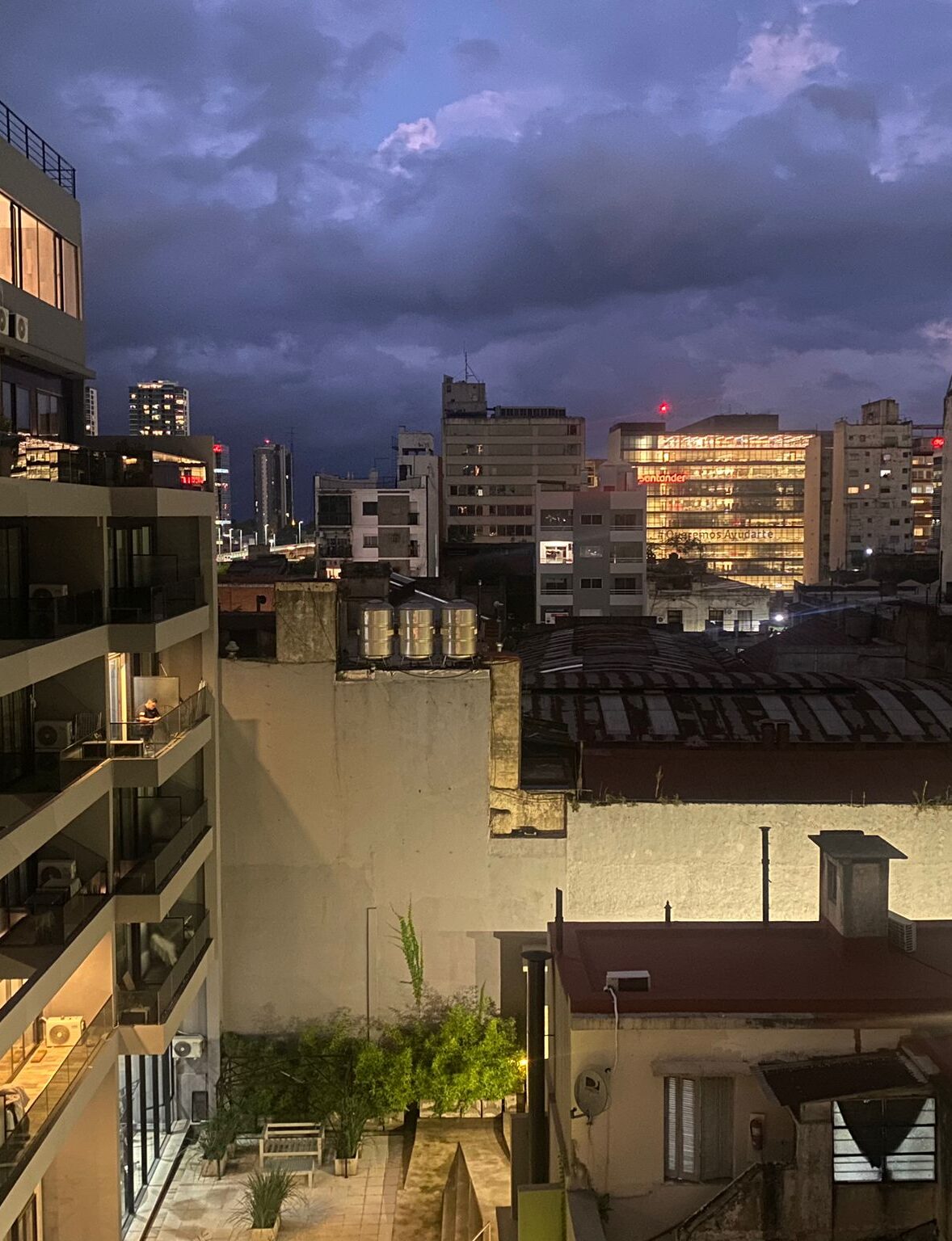
Mid-May in Galicia. I was expecting rain and gloom but at five in the afternoon the sun is still high as I come down from the dusty hills into the town of Fisterra. Here, the path along the beach into town is made of flat stones that shine so brightly I can barely see. I want to stop someone and ask if this is heaven. I haven’t spoken a word out loud for hours.
The government hostel is in the oldest part of the city, nestled at the base of a long hill that looks like a creature’s back rising out of the ocean. An old man in a panama hat yells to me from a plastic chair in the doorway of his shop and tells me I won’t find any cheaper prices up the street. I tell him I’m hoping to meet friends, and he spits on the ground and shakes his head as if he’s tired of people not taking his good advice. The buildings here are painted in faded pastels and misshapen into the curve of the hill. I have to rush to the side whenever a car pulls up behind me to keep it from honking for space.
Before long, Louisa the Irish musician appears around a corner and saves me from being a liar.
“Daniel,” she says, pulling me into a hug, as if she had been expecting me. “You made it!”
She’s talking a mile a minute before I can answer. We’re all going to the lighthouse. Bring wine. I don’t bother asking who ‘we’ is, but a very tall man with a grey moustache joins us and shakes my hand happily, congratulates me. His name is Jens and he’s a policeman from Denmark. I have to check in at the hostel and meet them as quick as I can to beat the sunset.
Left alone again, promises made, I walk to the government hostel and end up in a fight with the woman at the front desk over whether or not it is possible to make the walk from Santiago to Fisterra in two days. She wants to see the stamps I didn’t think to get and instead I show her photos of the landscape I’ve taken with my phone and try to remember as many details as possible: the little town that seemed comprised entirely of a stone bridge over a river, the tractor traffic-jam in a village with one street, the spot on the path outside of Cée where you see the ocean for the first time. She relents finally, and I leave my heavy backpack on a bunk in a room full of metal beds. I stop at the market next door and buy a carton of orange juice before stumbling up the path toward the lighthouse. I think if I drink any wine I will pass out.
In the days of Columbus, Spaniards knew Fisterra as the End of the Known World. Everything beyond it was undiscovered country. That notion feels pretty apt as I sit on the rocks overlooking the ocean and take long pulls from my carton of juice. I’m barefoot, my feet dangling in the air. Louise laughs at me as she hands a piece of chocolate to Sparky, a wide-eyed Wyomingite who spends half the year working as a carpenter in Antarctica. I accept my own piece of chocolate and take picture after picture of the sky.
We’re all sitting huddled around a makeshift fire pit with panoramic views of the Atlantic Ocean. The sun is just now hitting the horizon. You couldn’t ask for a more dramatic conclusion. Leo the German is trying to light a fire with some twigs he’s gathered. Others I haven’t met yet are taking pulls from open bottles of wine and discussing which articles of clothing to burn. That’s the custom, handed down from ancient pilgrim times and relayed to us as an anecdote. You reach the ocean and burn your clothing as a form of spiritual cleansing. One girl is trying to pull her bra out from under her shirt without taking it off. Someone else gestures at his shoes. I look at my own and think about how angry my mother would be if she knew I’d burned the shoes she bought me. The real world is slipping back in, sneaking up while we all take in the view.
Sparky asks if I have a photo of the final marker and I realize with a start that I haven’t seen it yet. I slide my boots on one more time and leave the party to walk back toward the brick lighthouse tower behind us. The sky is darkening quickly but the lantern at the top isn’t lit or spinning yet. Out of view, waves crash against the cliffs, competing with the murmur of happy voices.
I find the marker off to one side of the building that surrounds the tower. I’ve passed many of them over the past month: a white headstone with the yellow seashell symbol of the Camino set against a blue square background and the number of kilometers still left to walk. This one says zero kilometers. It says there’s nowhere else to go. I’m still not ready.
Daniel Sanchez’s work has been published in The Coachella Review and has been performed for the Beverly Hills Library’s New Short Fiction Series.
Photo by Flickr Creative Commons user Malcolm Bott.




